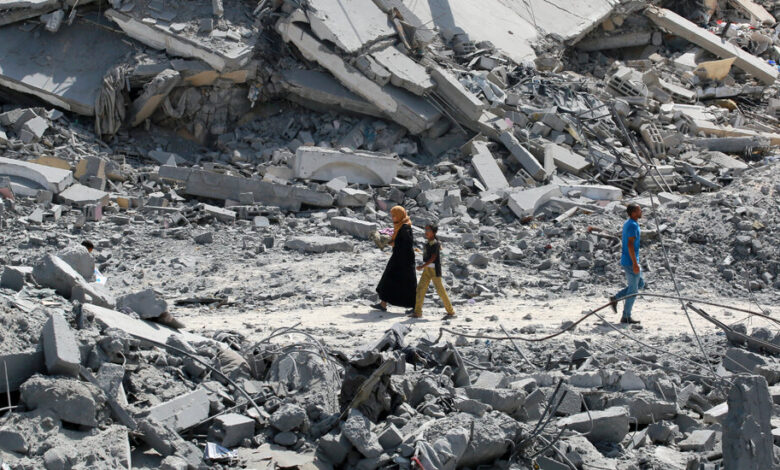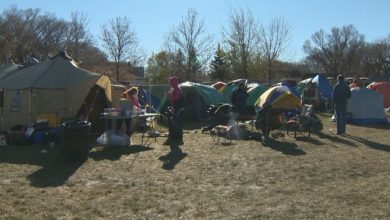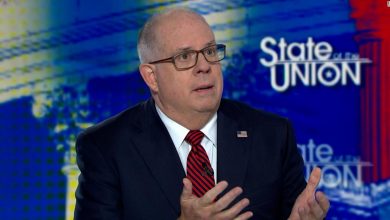Israeli leaders discuss Hamas response to ceasefire proposal

Israeli ministers are scheduled to meet Thursday evening to discuss Hamas’ response to a new proposal for a Gaza ceasefire and the release of hostages, even as an unusually large rocket and drone attack by the Lebanese militant group Hezbollah sparked wildfires on the country’s northern border.
Israeli Prime Minister Benjamin Netanyahu has given the green light for a new negotiating delegation to engage in deeper talks with mediators following Hamas’ response, an Israeli official said in a written statement to reporters on condition of anonymity. Such meetings have become rare in recent weeks as talks stalled in June.
Regional mediators — primarily Qatar and Egypt — have sought to revive stalled talks on a ceasefire in Gaza after nearly nine months of war. The Biden administration hopes that a ceasefire in Gaza will allow Israel and Hezbollah, which has fired on Israel in solidarity with Hamas, to also reach a diplomatic solution.
The discussions are based on a Three-phase framework deal announced by President Biden in late May and approved by the United Nations Security Council. Last week, Qatari mediators sent Hamas possible amendments in an attempt to bridge the gap between the two sides. Hamas has demanded stronger guarantees to limit Israel’s ability to abandon the deal and return to fighting ahead of the second phase of the deal, which would see a permanent ceasefire.
On Wednesday, Hamas said it had “exchanged some ideas” with mediators about a ceasefire, saying it was “actively handling” ongoing negotiations on the issue. It also submitted a final formal response that has been forwarded to Israel for consideration, the Israeli government said.
A second Israeli official, speaking on condition of anonymity because they were not authorized to speak publicly, said Wednesday night that there were still major gaps between the sides but that Hamas’ response left room for progress in the talks. The official declined to provide further details.
For months, Israel and Hamas, along with Qatar, Egypt and the United States, have been holding indirect talks on a potential ceasefire, which calls for a three-phase ceasefire in Gaza and the release of 120 hostages, both alive and dead, still held there. However, significant differences remain on key issues and talks have largely stalled since June.
The main obstacles relate to a fundamental dispute: Hamas wants assurances that the deal will lead to an end to the war and a complete withdrawal from Israel, while Israel has vowed to continue fighting until Hamas is destroyed and is also seeking post-war security control in Gaza.
In Israel, some influential members of Prime Minister Benjamin Netanyahu’s coalition government have expressed opposition to a potential deal with Hamas.
“Now is not the time to stop, but quite the opposite: It is time to bring in more forces and increase our military pressure,” Bezalel Smotrich, the country’s far-right finance minister, said on Tuesday. “It would be absurd for us to stop just a moment before success — final, total victory over Hamas.”
On Thursday, Hezbollah launched one of the largest attacks on northern Israel since the war began nearly nine months ago, setting off air raid sirens across the region for more than an hour and sending thousands of people running to fortified shelters. According to the Israeli military, about 200 rockets and mortars and 20 drones were launched into northern Israel.
Since the Hamas-led offensive on October 7, Lebanon’s politically powerful militant group Hezbollah has repeatedly attacked northern Israel in solidarity with Hamas, fueling Israeli attacks on Lebanon. More than 150,000 people on both sides of the Israel-Lebanon border have fled, unsure when they will be able to return home.
Since October, more than 80 Lebanese civilians and 11 Israeli civilians have been killed in fighting between Israel and militant groups in Lebanon, according to United Nations and Israeli government figures. More than 300 Hezbollah fighters have been killed, according to the group, as have at least 17 Israeli soldiers, according to the Israeli government.
Hezbollah said Thursday’s attack was partly in response to Israel assassination of a senior Hezbollah military commander the day before in the Tyre area of southern Lebanon. But Hezbollah’s ammunition was mainly fired at border areas, avoiding a wider attack on the Israeli heartland that would likely provoke a more serious response.
“A series of responses is still taking place in these moments and will continue, targeting facilities that the enemy never believed would be attacked,” Hashem Safieddine, a senior Hezbollah official, said in a televised speech. “This front will remain burning, strong and growing stronger.”
Hezbollah has said its forces will not stop attacks until Israel ends its military campaign in Gaza. At the same time, Israeli officials have increasingly threatened a potential attack in Lebanon to push Hezbollah away from the border.




